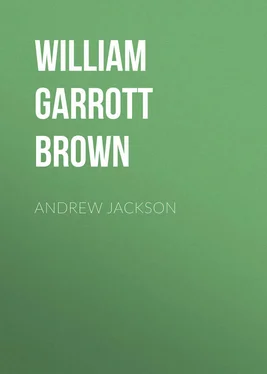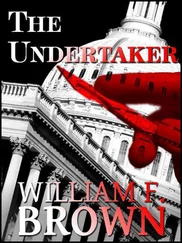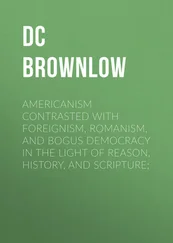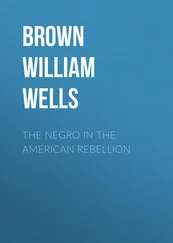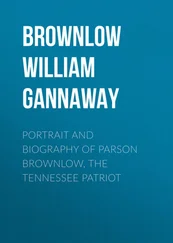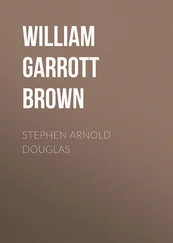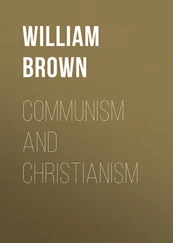William Brown - Andrew Jackson
Здесь есть возможность читать онлайн «William Brown - Andrew Jackson» — ознакомительный отрывок электронной книги совершенно бесплатно, а после прочтения отрывка купить полную версию. В некоторых случаях можно слушать аудио, скачать через торрент в формате fb2 и присутствует краткое содержание. Жанр: foreign_antique, foreign_prose, Биографии и Мемуары, на английском языке. Описание произведения, (предисловие) а так же отзывы посетителей доступны на портале библиотеки ЛибКат.
- Название:Andrew Jackson
- Автор:
- Жанр:
- Год:неизвестен
- ISBN:нет данных
- Рейтинг книги:5 / 5. Голосов: 1
-
Избранное:Добавить в избранное
- Отзывы:
-
Ваша оценка:
- 100
- 1
- 2
- 3
- 4
- 5
Andrew Jackson: краткое содержание, описание и аннотация
Предлагаем к чтению аннотацию, описание, краткое содержание или предисловие (зависит от того, что написал сам автор книги «Andrew Jackson»). Если вы не нашли необходимую информацию о книге — напишите в комментариях, мы постараемся отыскать её.
Andrew Jackson — читать онлайн ознакомительный отрывок
Ниже представлен текст книги, разбитый по страницам. Система сохранения места последней прочитанной страницы, позволяет с удобством читать онлайн бесплатно книгу «Andrew Jackson», без необходимости каждый раз заново искать на чём Вы остановились. Поставьте закладку, и сможете в любой момент перейти на страницу, на которой закончили чтение.
Интервал:
Закладка:
William Garrott Brown
Andrew Jackson
I
THE WAXHAWS AND THE WILDERNESS
In Lafayette Square, which fronts the White House at Washington, there is an equestrian statue of a very thin, long-headed old man whose most striking physical characteristics are the firm chin and lips and the bristling, upright hair. The piece is not a great work of art, but it gives one a strong impression of determination, if not of pugnacity. Sculptors have not the means to represent the human eye, else this impression might have been made stronger; for the old gentleman whose warlike aspect is here reproduced had a glance like a hawk's. He had, moreover, a habit of gazing fixedly at any one who attracted his attention. When he was angry, as he was quite frequently, few men could meet his look with composure. When he was in good humor, however, as he usually was when he dealt with his friends, or with women or children, his eyes could be very kindly, and his grim lips could part in a smile that was extremely attractive.
Not far away is the Treasury building. Were the horseman alive, by merely turning his head he could see its outline through the trees. There is a tradition in Washington that when this old man lived in the White House, and Congress voted to erect a new Treasury building, the old one being burned, there was some question of the exact spot on which it should stand. The question was put to him when he happened to be walking near the western end of Pennsylvania Avenue. He struck his cane on the ground and said shortly, "Put it here, sir," – and there it stands. Whether or not the story is true, it is characteristic of the man and in keeping with the history of his times; for when Andrew Jackson was President most things were done at Washington just as he ordered them to be done. His friends declared that this was so because in most things his will stood for the will of the American people; his enemies, that they were done for no good reason whatever, but only because a despot commanded his slaves to do them.
To this day there is the same division of opinion. The historians still fight the same battle over him and his doings which in former times was fought out by famous orators in Congress, by the whole people at the polls. It is doubtful, indeed, if there ever will be, until the end of the Republic itself, an end of the dispute over the place which that slender figure with the bristling hair ought to have in American history. Had Andrew Jackson any good claim to statues and monuments, to the first place in the Republic, to popularity such as no other man had enjoyed since Washington, to power such as Washington himself had never exercised? Did he prove himself worthy of the place and power he held? To answer either yes or no with assurance one must patiently examine more books than Andrew Jackson ever glanced through in his whole life. This little book would hardly contain the full titles of them all. Yet it may perhaps be large enough to let the reader see what manner of man he was concerning whom so many bitter controversies have raged. Perhaps it may serve to explain how a Scotch-Irish boy, born to the deepest obscurity and the wretchedest poverty, and blessed, apparently, with no remarkable gifts of mind or body, came to have statues carved in his honor, towns and counties and cities named for him, long books written about him, a great party organized to do his bidding, the whole country time and again divided into those who were for him and those who were against him.
It is quite important, as Mr. Parton, the most painstaking of all his biographers, often observes, that this particular poor boy was of Scotch-Irish stock. That stock is again and again conspicuous in American history, and Andrew Jackson was in many respects the most thoroughly representative Scotch-Irishman of all the notable Americans who can trace their descent to the North of Ireland. Indeed, it may be said that he narrowly escaped being born in the North of Ireland, for his parents were living at Carrickfergus until two years before his birth. They landed in America in 1765, and made their home in a Scotch-Irish settlement, the Waxhaws, on the boundary line between the two Carolinas. Andrew Jackson, the father, and Elizabeth Hutchinson, the mother, were married and had two sons before they left Carrickfergus. They were poor, and doubtless came to America for no other reason than to better their fortunes. They were still very poor when, in the early spring of the year 1767, the husband died. A few days later, March 15, a son was born to the widowed Elizabeth, and she named him Andrew. He himself in after years said that his birthplace was to the south of the state line, and called South Carolina his native State; but Mr. Parton's industrious researches make it seem more probable that the small log-house in which he was born was north of the line, in Union County, North Carolina.
The question is of less importance than the fact, of which there is no question, that he was born to the humblest circumstances in a new settlement of a new country, and that his childhood and boyhood were passed among people of little culture, whose lives were hard and bare. The boy got little education, and never was a scholar. To the day of his death, he wrote the English language with difficulty, making many errors of grammar and spelling, and spoke it with many peculiarities of pronunciation. Of other languages he knew nothing; of the great body of science, literature, and the arts he knew next to nothing. In fact, he probably got less from books than any other famous man in American history.
Little is authentically known of his early years. It is clear, however, that he was a mischievous, high-spirited boy, and often got into trouble. At least one anecdote is thoroughly in keeping with his career in manhood. Some of his playmates, so the story goes, once loaded a gun to the muzzle and gave it him to fire. As they expected, it kicked him over, but they missed the fun they looked for. He sprang to his feet white with rage, and exclaimed, with an oath, "If one of you laughs, I'll kill him!" – and no one laughed. The oath itself is not an unimportant part of the story, for it may as well be said at once that Andrew Jackson, until near the end of his life, had many such vices as swearing. He not only swore, but he frequently quarrelled and fought; he was at one time given to betting, particularly on horses; he drank, and he used tobacco constantly. All of these habits were common in the society to which he was born, and he did not escape them. But some things he did escape. He hated debt all his life, and was willing to do almost anything rather than incur it. He had the greatest reverence for women, and bore himself towards them with a courtesy and tenderness, a knightly purity of thought and word and deed, which the finest gentleman of the most ancient society in the world could not have surpassed.
When this pleasing fact is stated, one's thoughts turn naturally to his widowed mother, as to the most natural source of such an excellence in the son. All we know of her does indeed indicate that her influence on him was both strong and good: but we know very little. She was a simple, uncultivated person, like most of her neighbors, but her conduct during the harrowing scenes of the revolutionary war makes us think she was in some respects extraordinary. The struggle was nowhere rougher and fiercer than it was in the Carolinas. The notorious Colonel Tarleton operated in the Waxhaws neighborhood, and many dreadful stories of suffering and cruelty belong to that country and that time. The Jackson family had their full share of the fighting and the suffering. The two older boys, Hugh and Robert, enlisted. Young "Andy" himself, when he was barely in his teens, carried a musket. He and Robert were captured, and were released through the efforts of their mother, who brought about an exchange of prisoners. Soon afterwards, she went on a long and heroic journey to Charleston to nurse the sick Americans confined on the British prison ships there; and there she fell ill of the ship fever and died. Hugh and Robert both died in the service.
Читать дальшеИнтервал:
Закладка:
Похожие книги на «Andrew Jackson»
Представляем Вашему вниманию похожие книги на «Andrew Jackson» списком для выбора. Мы отобрали схожую по названию и смыслу литературу в надежде предоставить читателям больше вариантов отыскать новые, интересные, ещё непрочитанные произведения.
Обсуждение, отзывы о книге «Andrew Jackson» и просто собственные мнения читателей. Оставьте ваши комментарии, напишите, что Вы думаете о произведении, его смысле или главных героях. Укажите что конкретно понравилось, а что нет, и почему Вы так считаете.
